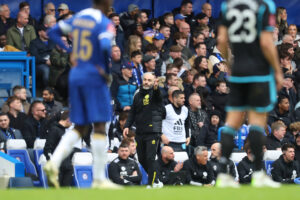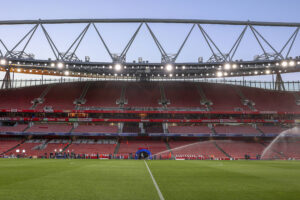Compared to a year ago, there are a few differences at Arsenal. Players have come and gone, as have a few executives and many minority shareholders. However, the most potent and exciting difference must be Unai Emery’s Pragmatism.
Unai Emery’s Pragmatism the Perfect Cure for Arsenal
Upon Arsenal’s drop into the Europa League in 2017, Arsène Wenger decided to impose heavy changes every week. Especially for the first half of the campaign, the squad found itself divided into two distinct teams, one which played in the Premier League and one in the Europa League.
Such a tact makes sense on paper; every player would get minutes, and the team would be fresh for every match. However, the results were not convincing.
Arsenal struggled mightily in both competitions, although managed to finish first in their Europa League group. Although this was tampered by the fact the club fell out of the title race even before Christmas.
Among the reasons for this issue was the fact that the players, despite receiving game time, knew that it was nearly impossible to be promoted from the Europa League squad or relegated from the Premier League team.
Meritocratic Selection
This has not been an issue under Unai Emery. For the season thus far, the Spaniard has selected the starting eleven for each match based on two key factors; performance and work rate. As long as a player is playing well and training hard, they get minutes.
For example, in the Europa League win over Qarabag in Azerbaijan, most pundits predicted heavy rotation due to the travel time and the impending Premier League visit to Craven Cottage. However, Unai Emery’s pragmatism prevailed.
Bernd Leno, Sokratis, Nacho Monreal and Alex Iwobi were all surprise inclusions, despite conventional wisdom dictating they be rested. The reason? The fact that all these players were in great form. The result? Three points.
Also, consider the team which faced West Ham in August. Mesut Özil was surprisingly dropped, despite the fact the team had yet to earn a single point in the league up to that point.
The reason is now known to have been a training ground bust-up between the playmaker and Emery, resulting in the German being dropped completely. However, the very next week Özil found himself back in the starting eleven.
Pierre-Emerick Aubameyang has also found himself on the bench for two consecutive Premier League matches. This is despite finding the back of the net regularly since joining the club in January.
The reason seems to be that Unai Emery prefers Alex Iwobi, who has been in fine fettle, on the left flank at the moment. The manager must be very pragmatic to select an academy graduate over a club-record signing, especially with the latter scoring goals.
Simply put, Emery does not show favourites, but forces players to earn their keep.
Timely Substitutions
One of Wenger’s faults which caused great consternation amongst fans was his reluctance to make early substitutions. The Frenchman almost never brought on a new face before the 75th minute.
However, an early hallmark of Unai Emery’s pragmatism is his willingness to change personnel as well as tactics. For example, Lucas Torreira alone has come on at half-time three times during his brief Arsenal tenure.
The other substitutions that Emery has made have also been a bit earlier in the second half compared to his predecessor. Against Leicester City, he made two changes in the 60th minute, with one coming at 80 minutes.
Facing Fulham, the changes came at 62, 66 and 80 minutes. Meanwhile, against Qarabag, they came at 46, 65 and 71 minutes.
Speaking of the match in Baku, two of the three substitutions were very much attacking changes, with Özil coming on for Emile Smith-Rowe and Alex Lacazette for Iwobi, while the team was already ahead by two goals.
That was unthinkable under Wenger, who placed immeasurable faith in his players and was always reluctant to make changes midway through a match. This was especially true with his team leading.
However, with Unai Emery’s pragmatism, Arsenal are not resting on their laurels anymore.
Mentally Weak?
Perhaps one factor in the timing of these changes is the fact that Arsenal have not held a lead going into half-time in the league so far this season. While the Gunners have only gone into the break behind once, this is not a comforting statistic.
However, aside from the two losses to Manchester City and Chelsea, the team has taken maximum points from these matches. For a club who struggled mightily last season, this feels like a breath of fresh air.
For example, Leicester were the better team for a large portion of the first half. They even went ahead via Ben Chilwell in the 31st minute. Instead of hanging their heads, the team rallied and started playing their best football of the match.
An equaliser late in the first half previewed what was probably the best 45 minutes of football Arsenal have played in a year or more.
Growing in Confidence
Several of the players also look more confident and mentally tough. For the duration of his Arsenal career, Alex Iwobi has looked short on confidence. Even when he worked into the right positions on the pitch, he would find himself unable to complete a key pass or bury a shot in the back of the net.
However, he is now playing better than he ever has and recently commented on Emery’s impact,
“Yeah, it’s going well, I’m very confident now. The manager is always being very positive to me, he’s always telling me to keep on going even if I make a mistake. That’s what I’m showing, and also proving to myself that I can put in 100 per cent throughout the game.”
Similarly, players like Hector Bellerin, Granit Xhaka and even Petr Cech are playing at a higher level than they have for the past year or two.
Unai Emery’s pragmatism has made a seismic impact at the club, resulting in winning ten matches on the bounce in all competitions. No doubt they are not the finished product, but Arsenal are well on their way.
Main Photo
Embed from Getty Images






